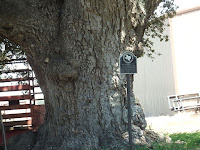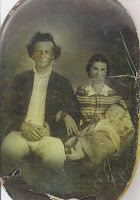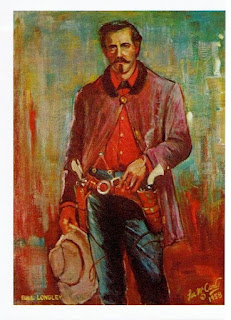 |
William Preston Longley—taken October 1877 in Galveston where he waited in jail for either an appeal or to be taken back to Giddings and hanged. |
|
|
It’s hard to find something positive to write about William Preston Longley, a ruthless, unpredictable, hot-tempered man who was a compulsive liar, self-admitted racist, and possible rapist.
“I have always known that I was doing wrong, but I got started when I was just a fool boy, led off by older heads, and taught to believe that it was right to kill sassy negroes, and then to resist the military law.”
Deadly quick with a gun, Bill boasted he killed 32 men. But when the official tally came down, it was more like five or six. The rest appear to be figments of Bill’s boastfulness and desire to be known as the worst “bad man” in Texas.
 |
| Wild Bill is said to favor the Dance pistol, a heavy, easy to load pistol manufactured by the Dance Brothers for the Confederacy. Only about 400 were made, and if they happen to come on the market, can sell for $120,000 and more. Bill is said to own serial #4. If you run across that one, the value of it could be astronomical. |
Bill grew up in Evergreen, a small community in Central Texas, raised by a family that all their neighbors vowed were “good people.” He was tall and handsome with keen black eyes. Talkative, lively, a good storyteller, he didn’t in the least look like a bad outlaw.
 |
The Evergreen Oak, a massive old live oak tree in Evergreen, Texas, Bill Longley's hometown. He is said to love the town, but the bright lights of other places called to him. Court was held under this oak, and some said hangings, too. The town withered away when the railroad bypassed it in 1870.
|
Because I grew up near Bill’s youthful stomping grounds, in researching him, I tried to peel back the layers rather than just write him off as a sorry, good-for-nothing bully.
Bill grew into manhood at the close of the Civil War when Texas was in an uproar of turmoil, going through the worst period of lawlessness it had ever known. His father, a member of a strict religious sect who wrote hymns to sing at camp meetings, had been a Unionist and not supported the Confederacy. While in many places in Texas such men were hung, the elder Longley was left alone because he had fought in the Battle of San Jacinto during the Texas Revolution.
 |
William Longley's parents,
Campbell and Sarah Longley |
Their neighbors’ sons had gone off to fight and die in a war that Bill’s father hadn’t supported, and right or wrong, it still stung. In addition to that, many members of the sect Bill’s parents belonged to believed that anyone who wasn’t a Campbellite was going to hell. Growing up in that separationist soil, it is not surprising that Bill went overboard in trying to gain admiration from his peers.
If his neighbors were resentful of newly freed blacks, then Bill went out of his way to devil them, and his first murder victim was a black man.
“My first step was disobedience; next, whiskey drinking; next carrying pistols; next, gambling, and then murder.”
At that time, there were vicious gangs roaming the woods in the area Bill grew up in, their chief interests being robbery and cattle rustling. They would burn down the house or barn of anyone who complained to the authorities. If the law did catch them, they would intimidate witnesses or get their relatives or other gang members on juries to secure releases. In some instances, they simply killed the accusers.
 |
| Outlaws like Sam Bass and Wild Bill Longley gambled and drank in this saloon that is now the McDade Historical Society Museum. |
Although Bill would later go on crime sprees with a few men, he did not join those gangs. And he never chummed with any other outlaw long. He always played the lone hand.
“I never had any confidence in nobody,” he explained to his jailor the night before he died when asked how he had managed to keep from getting killed or jailed for so long.
Bill would travel to faraway places, then come back and enthrall people with stories of all the men he had killed, and they believed him. During that time, men could be hung immediately for stealing horses or cattle, but they often got away with murder. The sheriff who eventually led Bill to the gallows along with one of the deputies who guarded him had both faced murder charges.
Bill once stopped at the home of a farmer, explaining a posse was on his tail. The farmer advised him to ride a little farther away, get off his horse and slap it to get it to keep running, then walk back. When the posse caught up with the horse and realized what Bill had done, they backtracked to the farm and searched it, but they didn’t come across Bill hiding in the outhouse and left.
 |
This Manheim store was probably built in the early 1900s.
On a farm near here, Wild Bill hid from a posse in an outhouse. |
Bill did try to get his younger brother Jim to join him. But Jim grew so disgusted with the depravity Bill was sinking into, he went home and told his parents about it, and they told Bill not to come back.
“They don’t want me to come about them so I stil alone tread the living land destitute of friends but g___d the world and every son of a bitch that don’t like me for I am a wolf and it is my night to howl.”
Bill, always eager for recognition, let his uncle talk him into a revenge killing over the death of a cousin. Jim argued that if revenge had to be done, there were closer relatives than Bill to do it, but he refused to listen. He killed the man, going on the run and killing two more men. He was eventually caught in Louisiana and brought back to Lee County to stand trial for the revenge killing.
 |
June, 1877 - Nacogdoches County Deputy Sheriff Bill Burrows (left),
Sheriff Milton Mast (right) Later that summer, 2,000 citizens
in Nacogdoches County signed a petition to have
Bill’s sentence changed to life imprisonment.
But Governor Hubbard refused to commute the
sentence of “that blood thirsty rascal.” |
By this time, people in Lee and the surrounding counties were fed up with the lawlessness around them. They had friends and relatives killed, been intimidated by fear to the point they dared not light lamps in their homes at night and often had to wear dresses while plowing in the fields to keep from being accosted. They believed the lies Bill had told them about all the men he had killed, and they were out for blood from somebody. Bill had no gang members to intimidate them, and although there was fear the Longleys might try to shoot the sheriff and help Bill escape, they weren’t seen as a threat to individuals.
 |
Lee County Texas Sheriff James Madison Brown.
He was also a gambler and made thousands racing horses.
He died in a shootout with Chicago police
at a racetrack when they attempted to
arrest him on an old murder charge from Texas. |
|
Bill was broke, his parents desperately poor. The attorney appointed to him by the court was inexperienced and gave a poor defense. It was almost a slam dunk decision—guilty. Sheriff Jim Brown pleaded with other jails to take Bill so he wouldn’t be hanged by a mob while waiting for an appeal. Galveston County finally agreed to hold Bill. For the next ten months, Bill, already a prolific writer of letters, wrote to newspapers of his life. The newspaper in Giddings, the Lee County seat, published them. Some newspapers refused, saying it would influence young boys to follow in Bill’s wayward path, but many others did. Always trying to outdo John Wesley Hardin, it irked Bill that he was getting the death penalty while Hardin was only getting 25 years for his crimes. But soon Bill began to realize that his audience no longer wanted to hear about his exploits and the depth of what his bragging had gotten him into. His tone in letters changed, and he began to try to explain his actions. Later, he showed repentance in the most flowery terms, becoming a Catholic and being baptized in the Galveston jail.
The letters to his brother Jim give a much more realistic view of Bill than the florid ones he gave to newspapers. Although he exhorted Jim not to try to seek revenge for his death, writing of how he had made his peace with God, in another, he gave a brief and vivid description of life in the wretched Galveston jail.
“My yellow girl brought me a bottle of kimbal yesterday. Jim, she is a pretty trick. She wants to come in my cell, but the sheriff won’t let her for fear she might bring me a saw. Henry Miller, the jailer, comes to the jail of mornings and laughs at me and tells me he crammed my girl last night. He says he crammed her for that dollar that she bought the kimbal with, and I expect he did. But she says he is a liar, but I rather think that she is the liar. Miller f**ks every woman in the city in twelve months, and a good many of the men.”
Bill begged Jim to ask their father to send him $25 for a new suit for his return to Giddings for the hanging.
“You know there will be many eyes on me and I hate to go out looking ragged.”
Although he professed to be ready for his hanging, Bill still harbored the hope that some way, he could escape death. Nevertheless, he was determined to play to the crowd and give people what he thought they wanted. He would die “game.”
He wrote a childhood friend that he was ready to die and had forgiven his enemies and hoped they had forgiven him.
“I am lively yet.... Hanging is my favorite way of dying, if I have to die.”
Back in the Giddings jail, Bill played melancholy tunes such as “Gentle Annie” on his violin. He became ghostly pale, a stark contrast with his dark eyes and hair. On the day of the hanging, the sheriff had rounded up about 100 men, half on foot, half on horseback, and all armed to see that it went off without a hitch. They roped off a section around the scaffold to keep the crowd, many of them black, from getting too close. The roads into Giddings were lined with the wagons and buggies of people who had come to see the hanging on that hot October day in 1878. One man described it as “as sad a scene as I ever saw in my life.”
 |
| Capt. Zina P. Eagleston (or Eggleston) (left) was in charge of the guards on horseback at Wild Bill’s hanging. Deputy Sheriff Isaac “Bose” Heffington was also there. Both men turned down the $50 to cut the rope opening the trap door. Both were also g-g-great uncles of mine from different sides of the family. Bose Heffington was killed by an unknown assailant in McDade in 1883. While researching this story, imagine my surprise when I found out the men Zina Eagleston was accused of murdering and assaulting were my g-g-great grandfather and his brother. He was a drunkard and had squandered Zina’s niece’s (my g-g-great grandmother’s) vast inheritance. If you had relatives living in this area in the 1800s, and you start digging around, don’t be shocked to find all sorts of killings in your family tree. And people who are still angry about it. |
Inside the jail, Bill asked the guards to join him in singing “Amazing Grace.” He dressed carefully in a black suit, white shirt, and black necktie. He put a blue rosette in his lapel and around his neck hung a Catholic medal. He combed his long hair and goatee, placing a broad-brimmed, low-crowned hat on his head.
Once outside, determined to appear lighthearted, Bill smoked a cigar, laughing and chatting with the guards. He finally said, “What are we waiting for?” and the sheriff answered, “Well, Bill, I just don’t want to rush you.” But Bill was ready. “Let’s get this over with.” As he climbed the rickety stairs up to the scaffold, one shook so badly, Bill turned to the guards and warned them to be careful. “Let’s don’t get crippled up before the show is over.”
After the sheriff read the death warrant, Bill was asked if he wanted to say a few words. He spoke of forgiveness and his hope that no one would try to avenge his death. His last words to the crowd were, “Goodbye, all; goodbye.” A number of people responded, bidding him farewell.
 |
| Illustration from The National Police Gazette, October 28, 1878. |
|
The sheriff had offered $50 to anyone willing to cut the rope to open the trap door, but he had no takers. When it came time, the sheriff couldn’t find the hatchet. Under the black cap that had been placed over his head, Bill said, “What do you want with a hatchet? Are you going to split my head open?”
The sheriff found the hatchet and cut the rope. But the rope around Bill's neck was too long and his feet thudded against the ground. The sheriff hastily raised the rope, and instead of having his neck snapped instantly as it should have been, Wild Bill Longley slowly strangled to death. The widow and children of the man he had killed were said to express satisfaction.
Bill’s body was taken to the outskirts of town and buried under a blackjack tree that old-timers swore died immediately.
For years, stories circulated that Wild Bill had somehow escaped, giving all sorts of explanations of how it happened. Sightings of him sprang up every so often. Superstitious blacks believed him to be the devil incarnate and expected him to appear at their church meetings at any time to raise havoc.
The belief that Bill had escaped hanging became so persistent, that in the 1990s, a search began to be made of the cemetery that had grown up around Bill’s then lost gravesite. In 1998, they found a grave of a tall man with a Catholic medal around his neck and the remains of a substance with a floral pattern that could have been the blue rosette Bill wore. DNA tests later proved it to be Bill’s remains.

 |
| Wild Bill was buried on the outskirts of the cemetery on a windy hill, and his grave was lost for many years. It was found, and his remains have since been moved closer to the front. |
The stories that Bill had escaped hanging can be traced back to his family. They had told his mother he survived for fear that she would go crazy if she knew Bill was really dead.
While researching this story, the thought kept running through my mind, why didn’t this sorry outfit stop drinking and gambling and do something to help his poor parents?
 |
Campbell Longley in
old age. He and Sarah
left Lee County in 1870,
moving to Salado in
Bell County. |
But at the end of Rick Miller’s biography of Bill, he relates a story told by historian A.C. Greene. Three months after Bill’s mother died, his father, at age 73, pretending to be wealthy, married a 28-year-old widow. She deeply resented being “pandered” off by her family to this old man who turned out not to be wealthy at all. Not only that, he allegedly tried to get her to put her children in an orphanage, which she refused to do, and the legend in their family has it he even tried to poison the children. She eventually separated from him.
And so another layer is peeled away from the Wild Bill story—a hypocritical father professing piety while hiding a dark mean streak.
Nevertheless, there is no excusing William Preston Longley’s behavior, and one can sympathize with Lee County citizens for wanting to stop further depredations.
But on the other hand, maybe the good Lord likes us to show a little mercy every now and then—even to Wild Bill Longley, a lone, lost soul living in a violent era.
Sources: “Bloody Bill Longley—The Mythology of a Gunfighter,” by Rick Miller. “The Badmen of the West” by George Hendricks. “Frontier Times” Vol. 9—No. 12, September, 1932. “Longley, William Preston (1851–1878)”—Handbook of Texas Online. http://www.texasescapes.com/ClayCoppedge/Dance-Pistols.htm. https://americanhandgunner.com/handguns/the-guns-of-bloody-bill-longley/. “A History of Lee County Texas” by Lee County Historical Survey Committee.



















Vicky, I don't know what's more interesting, the subjects of your research or the characters in your family. Either way, your posts are always fascinating. Thanks for illuminating a bad man I was unfamiliar with!
ReplyDeleteI'm so glad you enjoyed it, Jeff!
DeleteGreat post, Vicky, as always!
ReplyDeleteJim (Nik James)
Thanks, Jim! It's always great when other writers give praise.
ReplyDeleteVery nicely done, Vicky. You write fact as well as your great fiction. Not a combined skill many share with yoi.
ReplyDeleteThank you, G. Wayne, you are too kind. :)
DeleteExcellent piece of writing, Vicky. A thorough insight into one of the West's troubled bad men--boastful and, ultimately, repentant. Quite and entertaining read. Thanks!
ReplyDeleteThanks, Tom. I sort of wish I had emphasized more how likeable he could be when he wanted to. I think one of the reasons gossip spread so readily that he had survived the hanging was because he did go out so "game."
DeleteWell done. Longley has always been an intriguing character. Because of my work background, this post really fascinating. Thank you. Doris
ReplyDeleteOh, Doris, I'm so glad you liked it.
DeleteVicky, I always love your posts and this one is no exception. I didn't know about him, and this article of yours paints a vivid picture of him. Very interesting! I'm so glad you are blogging and giving us a chance to read these posts of yours!
ReplyDeleteThank you so much, Cheryl. You do so much to encourage members to post. Thank you!
DeleteGreat post, Vicky. An intriguing psychopath, it seems. Like others of that ilk it looks as if he was able to charm people. He played the crowd when he was on the scaffold and even joked about the missing hatchet! Fascinating.
ReplyDeleteYes, he could be a very likable and charming person when he wanted to be, Keith. So glad you enjoyed the post!
DeleteThank you for sharing this fascinating post, Vicky! I thoroughly enjoyed reading it.
ReplyDeleteThank you, so much Mark! Glad you liked it.
DeleteThank you for sharing this with us Vicky! I'd never heard of this guy before. Fascinating reading!
ReplyDeleteI'm so glad you enjoyed it, JES. They tried to whitewash him for a TV series, but it didn't take off, and he's mostly forgotten now.
Delete